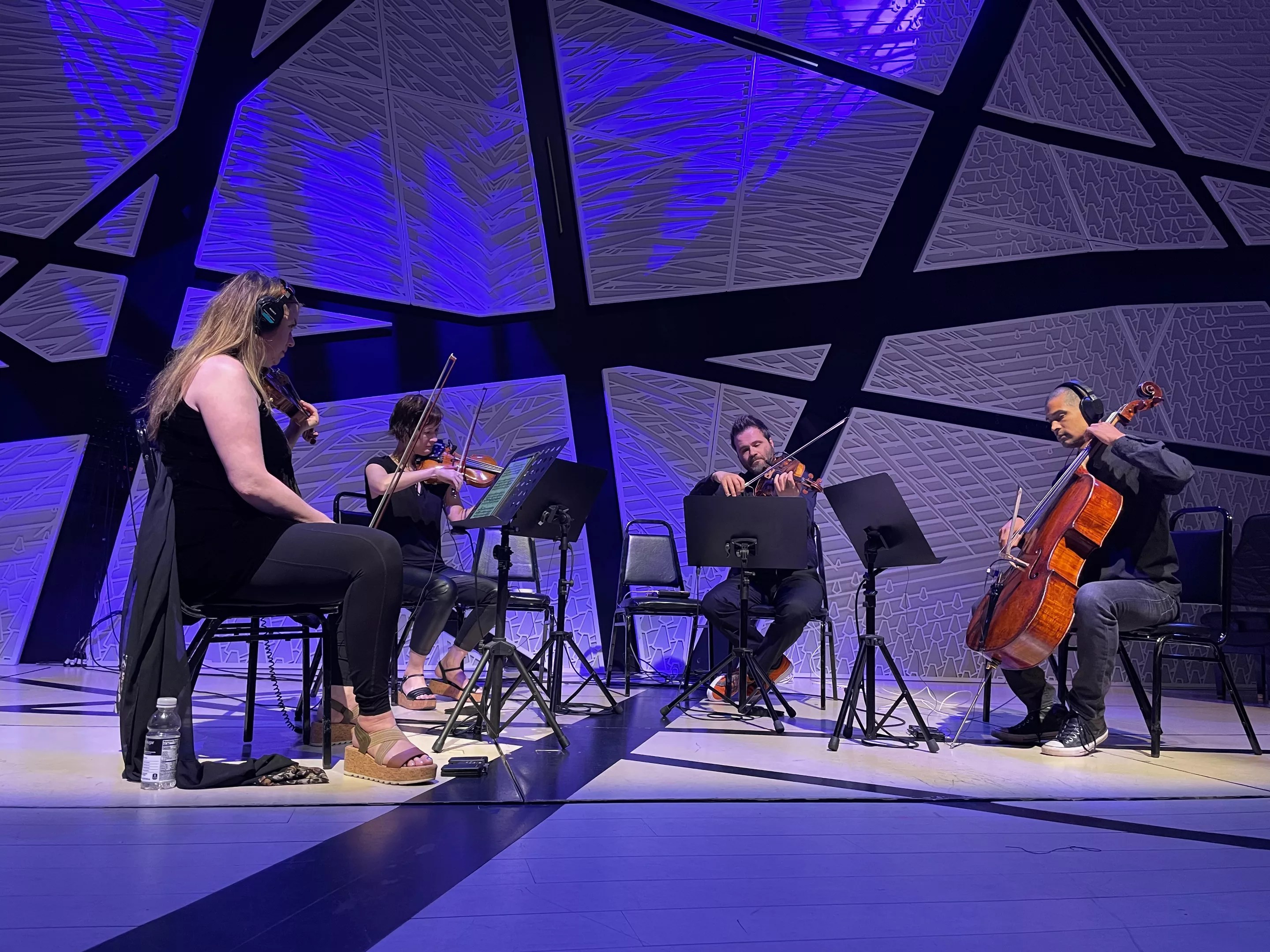
Steve Lewis

Audio By Carbonatix
Bathed in the blue-tinted light of the National Sawdust performing arts venue in Brooklyn, Jeffrey Zeigler, Miranda Cuckson, Milan Milisavljević and Lara St. John recorded the fugue movement from Beethoven’s “String Quartet #14 in C-Sharp Minor,” Opus 31. But this recording session was different: Their sound traveled thousands of miles to Colorado’s Tank Center for Sonic Arts as they played, transforming the seven-minute movement into a 44-minute masterwork that lingers on every note of Beethoven’s intricate counterpoint. The recording, aptly named Slow Beethoven, will be released on Friday, April 28, via Round Sound.
The Tank Center comprises a massive, seven-story Corten-steel water tank initially constructed in the 1940s as a railroad water treatment facility. It was moved to Rangely in the 1960s to be part of a fire suppression system for a local utility company, but was never used. The shale under the tank proved unable to support its water-filled weight, bowing its bottom into a sweeping parabola that created an incredible acoustic effect of swirling reverberation. Locals showed the newfound aural phenomenon to “sonic thinker” Bruce Odland in 1976, and the tank became a secret performance venue for several decades.
In 2015 the space was transformed into a nonprofit recording studio and concert venue, utilizing the unique acoustics for a plethora of musical creations. So when Odland – now a director on the Tank’s board and one of the venue’s sound artists – approached nationally renowned cellist and National Sawdust Ensemble music director Jeffrey Zeigler with the idea of recording one of Beethoven’s string quartets in the space, Zeigler was intrigued. He contacted his highly accomplished friends and colleagues and formed a string quartet specifically for the recording project.
But the pandemic threw a wrench into the plans, leaving Zeigler and the other members of the newly formed quartet unable to travel to Colorado. So they changed tactics, instead recording in National Sawdust and sending their sound to the Tank, where it played through individual speakers to re-create the sonic effect of a quartet. The sound was then sent back to the headphones of the musicians in Sawdust, allowing them to hear the forty-second reverberation in real time.
“We were able to still experience what we sounded like in the space and interact with it,” Zeigler says. “That eventually became the recording. But it was really cool, because we could hear the wind blowing and the birds chirping, so it was like we were there.”
Like most classically trained musicians, every member of the quartet has played Beethoven numerous times. Most classical performances try to adhere to the original tempo and style set by the composer, re-creating the music as closely to the original composition as possible. But the quartet was playing within a tempo seven times slower than the original. “This repertoire is very close to our hearts,” Zeigler emphasizes. “We know it in a certain fashion, and so we had to fight against that pull as we were playing. It was very hard.”
That pull wasn’t the only challenge the quartet faced. The musicians discovered it was impossible to add edit points to the recording without disrupting the reverberations, so every take they did comprised 44 minutes of intense mental and physical concentration. “You’re counting like you’ve never counted before,” Zeigler describes. “The timing messes with you, and the notes begin to play tricks on you, so it was a huge mental and physical challenge.”
The quartet considered recording Beethoven’s “Grosse Fugue,” Opus 133, but found it would take too long to get to any point of hope in the piece, leaving the listener swimming in a sea of darkness. So the musicians settled on the C-sharp minor string quartet, which they felt created an ethereal atmosphere with the Tank’s reverb.
“My hope is that playing it at that speed, and having that feeling of being in this extremely resonant space, that one gets transported to another place,” Zeigler says.
He knows that this isn’t the most accurate or “perfect” interpretation of Beethoven, but he hopes that once the recording starts, the audience will listen with an open mind. “We do believe that it is beautiful and it is sublime,” he says, “and it’s meant to honor Beethoven.”
Zeigler stepped into the recording studio expecting to find hidden meaning within Beethoven’s counterpoint, but instead says he felt as if he was transported to another dimension: “It’s not understanding the counterpoint as much as somehow the counterpoint is something that connects directly with your soul.”
Slow Beethoven releases via Round Sound on Friday, April 28.